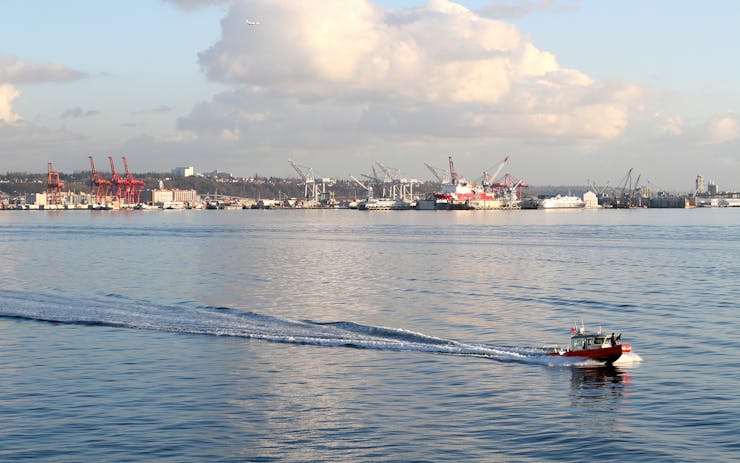Planning on grabbing a vape pen for an afternoon on the water? Rolling a joint for your next fishing trip? Thinking of floating the river with an infused soda in hand? Think again. According to the US Coast Guard, it remains illegal to consume while on a boat in US waters—even if you’re in a state that has legalized cannabis.
State laws around the plant might have changed, District 13 (Seattle) Petty Officer 2nd Class Ali Flockerzi told Leafly, but federal law still prohibits the production, distribution, possession, and consumption of cannabis.
That’s true on land, too—cannabis remains illegal under federal law. But in many legal states, you’re more likely to run into a federal agent on a boat than on the sidewalk.
“The Coast Guard enforces federal laws within all navigable waters of the U.S. along with federal partners operating under guidance from the Department of Justice,” Flockerzi said. “If you are boating on open water in Washington State, you come under the jurisdiction of both Washington State and federal law, which is enforced by the Coast Guard.”
On top of the fact that cannabis itself is federally illegal, it’s also illegal under both state and federal law to operate a boat while under the influence of any substance.
“Operating a boat while under the influence of ANY drugs or alcohol is considered boating under the influence (BUI),” Flockerzi told Leafly. “Boating under the influence is not only unsafe but also illegal in every state, and the Coast Guard and every state have stringent penalties for violating BUI laws.”
A BUI also counts as a prior offense if a person were to be convicted of a DUI.
“Under the DUI sentencing laws, anyone with BUI or reckless boating convictions on their record that is later convicted of a DUI will have the BUI treated as a prior offense,” Flockerzi said. “Making a DUI a prior can dramatically increase penalties for somebody later convicted of DUI, vehicular assault or vehicular homicide.”
Penalties can include jail time, large fines, suspension, or revocation of boat operator privileges.
The law pertains to the operation of all boats, from canoes to catamarans, and includes foreign vessels that operate in US waters as well as US vessels on the high seas.
And while you may have privacy rights that protect your car from an unwarranted search, the Coast Guard can board your boat at any time—both in US waterways and on the high seas. So if you live aboard a boat, it’s still technically illegal for you to hold cannabis on the boat.
Shop highly rated dispensaries near you
Showing you dispensaries nearThe Coast Guard Boarding Policy states:
Title 14 Section 89 of the United States Code authorizes the U.S. Coast Guard to board vessels subject to the jurisdiction of the United States, anytime, any place upon the high seas and upon any waterway over which the United States has jurisdiction, to make inquiries, examinations, inspections, searches, seizures, and arrests. The U.S. Coast Guard does not require a warrant to conduct search, seizures, arrests over any United States Waterway or high seas. The U.S. Coast Guard also have full legal law enforcement power on any land under the control of the United States, as needed to complete any mission.





